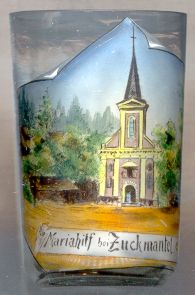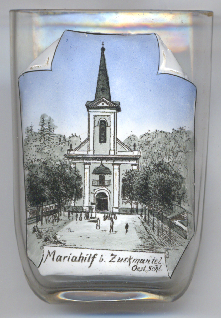

|
| ČESKÁ REPUBLIKA | CZECH REPUBLIC |
| Olomoucký kraj | Olomouc region |
| Okres: Jeseník |
Zlaté Hory is situated at an elevation of 416 m close to the Polish border in the Jeseník district of the Olomouc region of the Czech Republic. The municipality has a population of about 3,700 (2023).
The place was founded as a mining settlement by the bishops of Wrocław in the 13th century. The first mention in a document dates from 1224. At first the place was named Edelstadt but soon became known as Cukmantl in Czech or Zuckmantel in German. The place obtained the status of a town in 1306; the privileges were confirmed in 1445. In 1505 the town also obtained the privilege for minting gold coins. In 1742 Cukmantl remained in the small Austrian part of Silesia. Mining for gold ended soon after that in 1770. A sanatorium for cold water cures opened in 1879. The most famous guest of the sanatorium probably was the Austrian writer Franz Kafka who stayed here in 1905 and in 1906. After World War II the name of the municipality was changed to Zlaté Hory ('golden mountains') in 1948.


The  pilgrimage church of Our Lady of Perpetual Help [left, no. 1654, and right, no. 4877]
was erected on an old site of worship. Pilgrimages to this site are documented since 1718.
The chapel shown on the glass was built in 1835–1841.
After World war II the chapel was left to fall into dereliction. The remaining ruins were blown up in 1973.
The foundation stone for a new chapel was consecrated by Pope John Paul II on 22nd of April 1990 when he
visited Velehrad. The reconstruction began in 1993 and was finished in 1995.
pilgrimage church of Our Lady of Perpetual Help [left, no. 1654, and right, no. 4877]
was erected on an old site of worship. Pilgrimages to this site are documented since 1718.
The chapel shown on the glass was built in 1835–1841.
After World war II the chapel was left to fall into dereliction. The remaining ruins were blown up in 1973.
The foundation stone for a new chapel was consecrated by Pope John Paul II on 22nd of April 1990 when he
visited Velehrad. The reconstruction began in 1993 and was finished in 1995.
![[scale]](lineal.jpg)